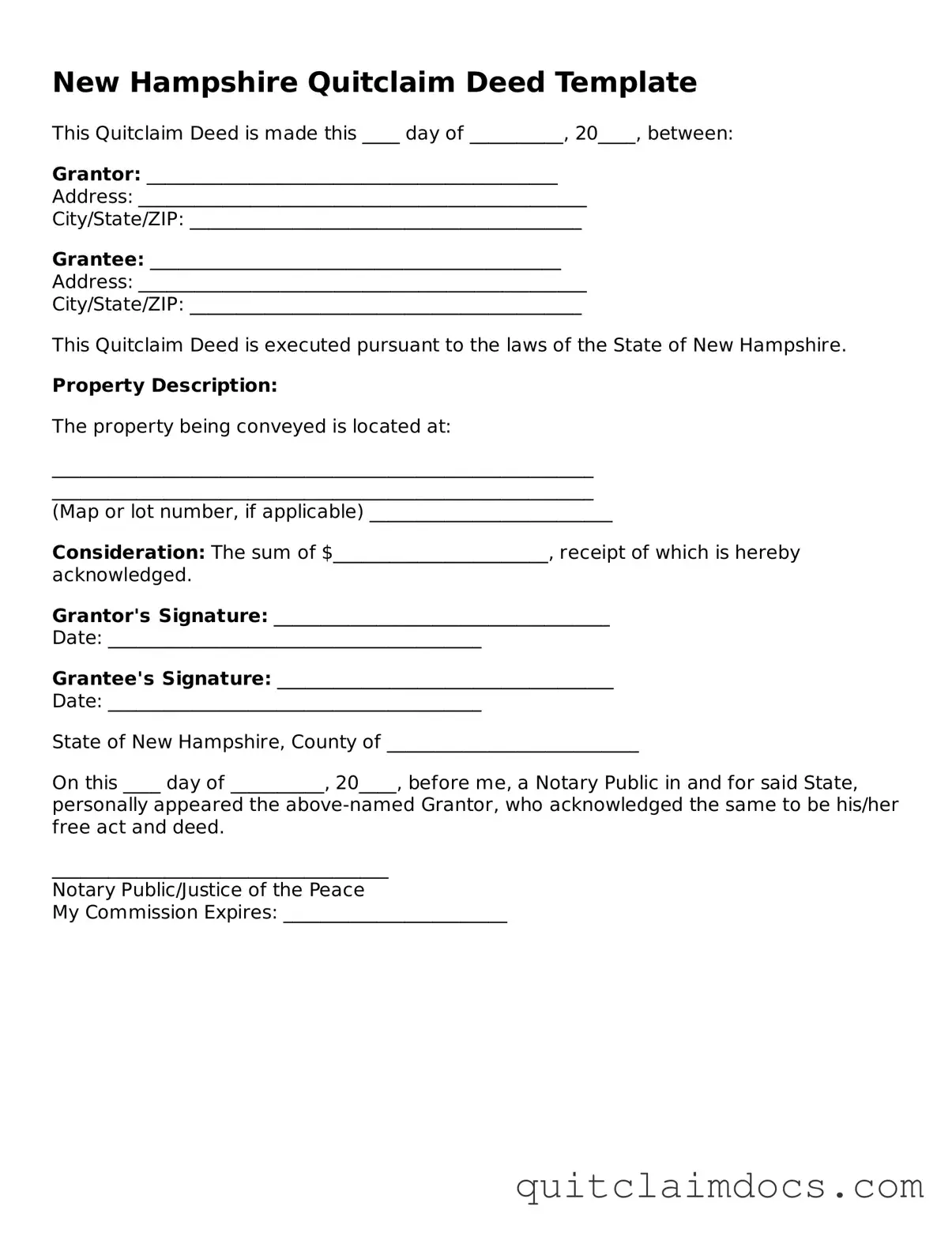Free Quitclaim Deed Template for New Hampshire
Other Popular Quitclaim Deed State Templates
Rhode Island Quit Claim Deed Form - This form can be used to clear up title issues or establish clearer property lines.
Quitclaim Deed Connecticut - This type of deed is commonly seen in divorce settlements when one spouse transfers property to the other.
Misconceptions
Understanding the New Hampshire Quitclaim Deed can be challenging due to various misconceptions. Here are nine common misunderstandings:
-
Quitclaim Deeds Transfer Ownership Completely.
Many people believe that a quitclaim deed transfers full ownership rights. In reality, it transfers whatever interest the grantor has in the property, which may be none at all.
-
Quitclaim Deeds Are Only for Family Transfers.
While often used among family members, quitclaim deeds can be utilized in various situations, including sales and transfers between unrelated parties.
-
Quitclaim Deeds Are the Same as Warranty Deeds.
This is a significant misconception. Unlike a warranty deed, a quitclaim deed does not guarantee that the grantor has clear title to the property.
-
Quitclaim Deeds Are Only for Real Estate.
People often think quitclaim deeds apply solely to real estate. However, they can also be used to transfer other types of property interests.
-
Quitclaim Deeds Are Irrevocable.
Some assume that once a quitclaim deed is executed, it cannot be undone. In fact, the grantor may have the option to revoke the deed under certain conditions.
-
Quitclaim Deeds Require Notarization.
While notarization is recommended for validity, it is not a strict requirement for a quitclaim deed to be legally effective in New Hampshire.
-
Quitclaim Deeds Can Only Be Used in New Hampshire.
This is misleading. Quitclaim deeds are recognized in many states across the U.S., though the rules and requirements may vary.
-
Quitclaim Deeds Eliminate All Liabilities.
Some believe that using a quitclaim deed removes all financial responsibilities related to the property. However, existing liens or mortgages may still apply.
-
Quitclaim Deeds Are Simple and Do Not Require Legal Advice.
While the process may seem straightforward, consulting with a legal professional can help avoid potential pitfalls and ensure proper execution.
Being aware of these misconceptions can help individuals make informed decisions when dealing with quitclaim deeds in New Hampshire.
PDF Form Details
| Fact Name | Description |
|---|---|
| Definition | A Quitclaim Deed is a legal document used to transfer ownership of real estate from one party to another without any warranties about the title. |
| Governing Law | The Quitclaim Deed in New Hampshire is governed by New Hampshire Revised Statutes Annotated (RSA) 477:1-3. |
| Use Cases | This type of deed is often used among family members, in divorce settlements, or when clearing up title issues. |
| Consideration | While a Quitclaim Deed can be executed without payment, it is common to include a nominal consideration, such as $1, to validate the transaction. |
| Filing Requirements | After signing, the Quitclaim Deed must be recorded at the local Registry of Deeds to be legally effective against third parties. |
Key takeaways
When filling out and using the New Hampshire Quitclaim Deed form, it is important to keep several key points in mind.
- Understand the purpose: A Quitclaim Deed transfers ownership of property from one person to another without guaranteeing that the title is clear. It is often used among family members or in situations where the buyer trusts the seller.
- Complete all required information: Ensure that all fields on the form are filled out correctly. This includes the names of the grantor (the person transferring the property) and the grantee (the person receiving the property), as well as a description of the property.
- Sign in front of a notary: The Quitclaim Deed must be signed by the grantor in the presence of a notary public. This step is crucial for the document to be legally valid.
- File with the appropriate office: After completing the deed, it should be filed with the local registry of deeds in New Hampshire. This ensures that the transfer of property is officially recorded.
New Hampshire Quitclaim Deed Example
New Hampshire Quitclaim Deed Template
This Quitclaim Deed is made this ____ day of __________, 20____, between:
Grantor: ____________________________________________
Address: ________________________________________________
City/State/ZIP: __________________________________________
Grantee: ____________________________________________
Address: ________________________________________________
City/State/ZIP: __________________________________________
This Quitclaim Deed is executed pursuant to the laws of the State of New Hampshire.
Property Description:
The property being conveyed is located at:
__________________________________________________________
__________________________________________________________
(Map or lot number, if applicable) __________________________
Consideration: The sum of $_______________________, receipt of which is hereby acknowledged.
Grantor's Signature: ____________________________________
Date: ________________________________________
Grantee's Signature: ____________________________________
Date: ________________________________________
State of New Hampshire, County of ___________________________
On this ____ day of __________, 20____, before me, a Notary Public in and for said State, personally appeared the above-named Grantor, who acknowledged the same to be his/her free act and deed.
____________________________________
Notary Public/Justice of the Peace
My Commission Expires: ________________________
Dos and Don'ts
When filling out the New Hampshire Quitclaim Deed form, it is crucial to follow certain guidelines to ensure accuracy and compliance. Below is a list of essential do's and don'ts.
- Do provide accurate property descriptions to avoid any confusion or disputes.
- Do include the names of all grantors and grantees as they appear on official documents.
- Do ensure that the form is signed in the presence of a notary public.
- Do check for any outstanding liens or encumbrances on the property before proceeding.
- Don't leave any sections of the form blank; incomplete forms can lead to delays.
- Don't use incorrect or outdated legal descriptions; verify with local records.
- Don't forget to file the completed deed with the appropriate county registry of deeds.
Adhering to these guidelines will facilitate a smoother process when executing a Quitclaim Deed in New Hampshire.
